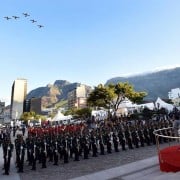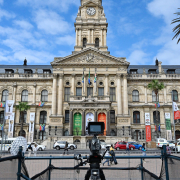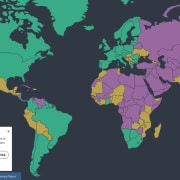|
Getting your Trinity Audio player ready...
|
Parliament secretary Xolile George briefed the media and the country on Thursday 13 June on the state of readiness for the scheduled first sittings of the seventh parliament’s National Assembly (NA) and National Council of Provinces (NCOP). The sittings take place on 14 and 15 June 2024, respectively.
“We are managing … a mammoth task to help birth the existence of a seventh administration,” said George. “That process inevitably invokes the three arms of the state to work collaboratively in service of the co-creation of the seventh administration so it’s a very serious undertaking. As we do that, indeed, we live true to the spirit of our Constitution that defines clearly the transition intervals that assist in renewal of mandates of a government that, in line with the spirit of the Constitution, will be able to draw legitimacy through the will of the people.”
The will of the people, he added, was clearly expressed on 29 May, the day of national elections.
George went on to paraphrase the preamble of the Constitution: “We the people, recognise the injustices of the past, honour those who laid down their lives and sacrificed for our country, and also make commitment that as a diverse nation we will elect a government on the basis of the will of the people and we do so through the directly elected members.”
This is a significant moment in South Africa’s democratic journey, he added. “The first sittings of the National Assembly and the National Council of Provinces represents not only the establishment of this new parliamentary term but also the institutionalisation and the expression of the electoral will of the people.”
The parliamentary administration has worked hard over the past months to ensure a seamless transition from the sixth to the seventh term of Parliament, said George. Although he acknowledged that the “delicate constitutional process” was not without its challenges, collaboration between the three arms of government enabled those challenges to be overcome.
“This collective effort underscores our commitment to upholding the democratic principles that underpin our Constitution and to ensuring that the will of the people is effectively translated into action.”
Chief justice at the helm
George explained that it is the chief justice’s duty to set the dates of the first sittings within the 14-day period mandated by the Constitution after the official declaration of the election results, and to preside over those sittings.
However, with the old Parliament building still undergoing repairs from a fire that severely damaged it in 2022, the sittings on 14 and 15 June will take place at the Cape Town International Convention Centre (CTICC).
“The CTICC has been declared as a precinct of Parliament, in terms of the Powers and Privileges Act of Parliament. This determines the seat of Parliament and also empowers the institution to define any place that it sits as part of the precinct.”
The CTICC was deemed more appropriate for the first parliamentary sittings than was the City Hall which hosted many meetings since 2022, because of the various other processes that are to happen at those initial sittings.
“The voting processes, the arrangements for sitting members, the balloting process and all of those, you wouldn’t be able to do it in a venue like we use at the level of City Hall. The ballots are secret, so we need to prepare balloting infrastructure to be able to perform that undertaking.”
Meanwhile, he said, Parliament’s administration has been engaging with elected members and their parties to capture their details in the system and conduct an orientation with them, and making logistical arrangements for their travel and accommodation. “So far we have successfully onboarded no less than 180 members … as we sit here it might be 200.”
Suffice it to say, George said, “we are quite ready and our teams are in action.”
Swearing in
The first sitting of the NA will commence with the swearing in of all designated members in attendance, over which the chief justice will preside. The chief justice will also preside over the election of the speaker of the NA, and once elected, the newly appointed speaker will take over the proceedings and preside over the election of the deputy speaker.
“These elections are crucial for the proper constitution of the National Assembly as they ensure that the leadership structure is in place to guide the House functions and related duties of the day.”
George then took the audience through details of the election process, saying that only once the House is fully constituted is it able to discharge its responsibilities.
“The next order of proceedings will be a call for the nominations of a candidate to be the president-elect of the Republic of South Africa – that will be the third order of proceedings. The same procedure will be followed as with the election of a speaker and deputy speaker, and that would also be presided over by the chief justice.”
After getting the parliamentary green light, the president-elect must be sworn into office within five days. Here, Parliament will also assist with members’ and their guests’ transport and accommodation. George mentioned 19 June as a favourable date for the inauguration. Immediately after this ceremony, a date will be set for the official opening of the seventh Parliament.
In the meantime, the parliamentary team will conduct an induction program with members, especially the new ones, ensuring they are familiar with the house rules and regulations, the code of conduct, and their roles and responsibilities as members of Parliament.
Regarding the NCOP, George said, 54 members will be sworn in as the first order of business on Saturday 15 June. “Why 54 members? These represent provinces in terms of the permanent delegates that must be drawn in to represent all the provinces, so we’ve got nine provinces, each of those have six members, which makes 54 and then thereafter you’ve got four delegates in each province that are classified as special delegates, so each province has got 10 delegates in total.”
After presiding over the swearing-in of the 54 designated permanent delegates, the chief justice will chair the election of the chairperson of the NCOP. “Once elected, the new chairperson will take over the proceedings and preside over the election of the deputy chairpersons. The House is mandated to appoint one permanent deputy chairperson and a second deputy chairperson on a one-year rotational basis.”
One of the new features of both first sittings, said George, will be the performance of the national anthem by a full complement of the official parliamentary choir of 30 choristers. “We’re excited that we’re bringing them back after being demobilised by Covid-19.”
In addition, representatives of diverse interfaith groups will offer blessings at the beginning of the proceedings. “This inclusive and ceremonial start aims to reflect the unity and diversity of our nation.”







